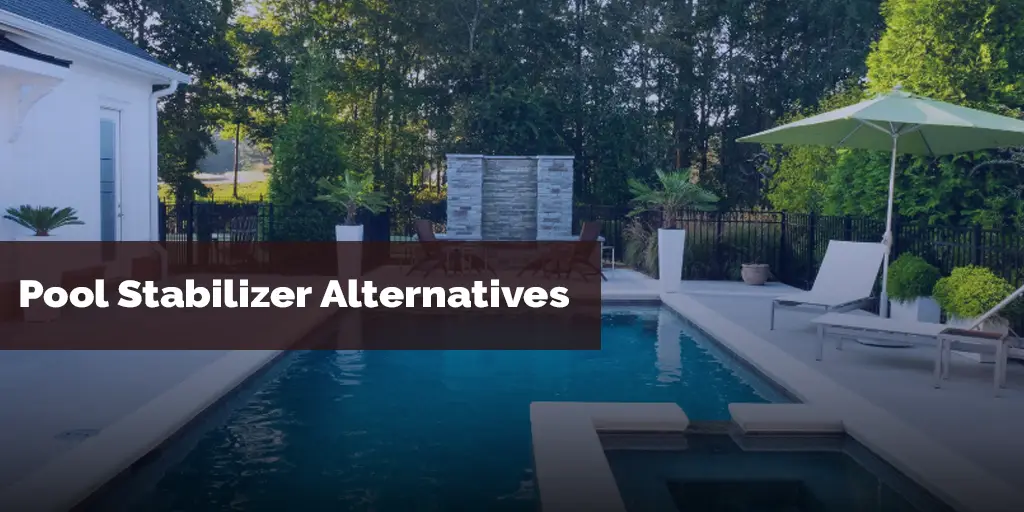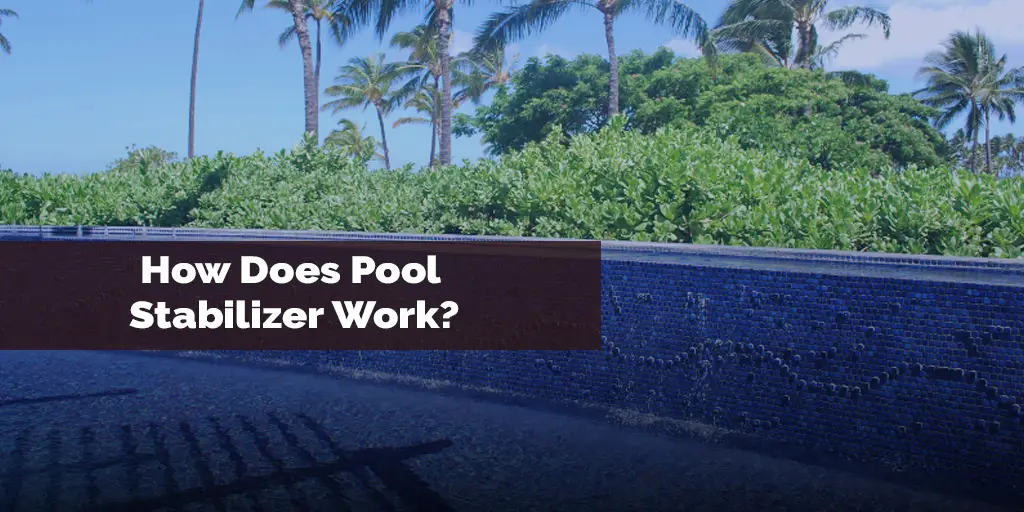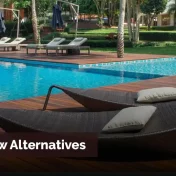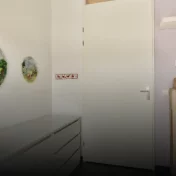Every pool owner knows the joy of a sparkling clean swimming pool on a hot summer day. But behind that shimmering water lies the science of pool cleaning, ensuring a safe and enjoyable experience.
One of the pivotal elements in this process is the pool stabilizer. But as with everything in life, people often seek alternatives.

With the rise of different pool types, from chlorine pools to salt water pools, and even hot tubs, the question arises: Is there a viable pool stabilizer alternative?
In this guide, we’ll dive deep into the world of pool stabilizers, understand the integral role of cyanuric acid, and explore potential alternatives that pool owners across the globe are considering.
Whether you’re a seasoned pool owner or someone just dipping their toes into the world of pool maintenance, this guide promises to shed light on one of the most debated topics in the swimming pool community.
What Is Pool Stabilizer?
The heart of every swimming pool’s chemistry is its stabilizer. But what makes it so essential?
At its core, pool stabilizer is cyanuric acid. Among pool owners and experts, it’s frequently abbreviated to CYA.
If you’ve ever pondered the need for this compound in your swimming pool or hot tub, here’s why:
- Protection Against Sun: Chlorine, whether in a salt water or chlorine pool, is sensitive to sunlight. Direct sunlight can cause it to dissipate rapidly. CYA acts as a protective shield, safeguarding chlorine from the sun’s potent UV rays.
- Economic Benefits: As pool cleaning costs rise, using a stabilizer ensures you’re not constantly replenishing chlorine, leading to long-term savings.
- Chemical Balance: Achieving a balanced pool chemistry ensures safety for swimmers and a crystal-clear appearance. CYA is pivotal in maintaining this balance.
Facts:
- Origins of CYA: Introduced in the early 1800s, cyanuric acid has since been a staple in pool cleaning.
- Safe Levels: For optimal pool health, the CYA concentration should be between 30 to 50 ppm.
While the benefits of pool stabilizers are evident, the quest for a pool stabilizer alternative remains. As we progress through this guide, we’ll delve into this and more.
How Does Pool Stabilizer Work?

Understanding the mechanics behind pool stabilizers is essential for every pool owner. Let’s break down its function step by step:
- Chlorine’s Role: Chlorine is the primary disinfectant in swimming pools. It’s responsible for eliminating harmful bacteria, germs, and other contaminants, ensuring a safe swimming environment.
- Chlorine’s Vulnerability: While chlorine is effective, it’s also volatile. Direct exposure to sunlight, especially in outdoor pools and hot tubs, can cause rapid chlorine evaporation. This is where the pool stabilizer steps in.
- CYA as Chlorine’s Protector: Cyanuric acid, or CYA, forms a protective layer around chlorine molecules. This protective action reduces the rate at which chlorine is burned off by the sun’s ultraviolet rays.
The Process:
- Addition of CYA: When introduced into a swimming pool or hot tub, cyanuric acid dissolves in the water.
- Bond Formation: CYA molecules bond with free-floating chlorine, creating a more stable compound.
- Shielding Action: This bonded compound is less susceptible to UV degradation. As a result, chlorine remains in the pool for a more extended period, continuously disinfecting the water.
The Result: With CYA in action, pool owners can maintain a consistent chlorine level, ensuring uninterrupted pool sanitation. This also means reduced chlorine consumption, leading to cost savings in pool maintenance.
Chlorine Levels with and without CYA:
| Condition | Chlorine Level after 2 hours of Sunlight | Chlorine Level after 4 hours of Sunlight |
|---|---|---|
| Without CYA | 50% reduction | 90% reduction |
| With CYA | 10% reduction | 30% reduction |
The difference in chlorine retention with and without CYA is clear. However, as with every chemical, moderation is key.
Over-reliance on stabilizers can lead to its own set of challenges, which raises the question: Is there a viable pool stabilizer alternative? Let’s explore further.
What Happens Without Pool Stabilizer?
The absence of a stabilizer in a swimming pool can lead to several challenges, affecting both the pool’s health and the pocket of pool owners. Let’s delve into the potential repercussions:
- Rapid Chlorine Depletion: As discussed earlier, without the protective shield of CYA, chlorine evaporates at an accelerated rate when exposed to sunlight. This rapid loss means that pools, especially outdoor ones, require frequent chlorine replenishment to maintain safe levels.
- Increased Pool Maintenance Costs: Regular chlorine additions translate to increased expenses. For pool owners, this can result in a significant rise in monthly pool maintenance costs.
- Algae and Bacteria Growth: Consistently low chlorine levels can create an environment conducive to algae and bacteria growth. This not only affects the pool’s appearance, turning the water green and murky, but also poses health risks to swimmers.
- Fluctuating Pool Chemistry: A pool’s chemistry is a delicate balance. Without stabilizers, pool owners might find themselves in a constant battle to maintain the right pH, alkalinity, and chlorine levels.
Did You Know?
- Algae blooms can occur overnight, especially in warm and sunny conditions. Regular pool cleaning and maintaining optimal chlorine levels are crucial to prevent these blooms.
- Bacteria such as E. coli and Salmonella can thrive in poorly maintained pools, leading to illnesses in swimmers.
Recommendations for Pool Owners:
- Regular Testing: Use pool test strips or kits to check chlorine and CYA levels regularly. This helps in timely interventions.
- Shade: If not using stabilizers, consider providing some shade to the pool during peak sunlight hours. This can slow down chlorine evaporation.
- Alternative Disinfection Methods: For those keen on exploring pool stabilizer alternatives, there are other disinfection methods, like ozone generators or UV systems. However, these may come with their own set of pros and cons.
Without a stabilizer, the task of maintaining a swimming pool becomes labor-intensive and costly. However, the quest for a perfect pool stabilizer alternative continues, as pool owners seek more sustainable and cost-effective solutions.
Economical Ways to Buy Pool Stabilizer
Every pool owner is on the lookout for ways to make their pool maintenance more budget-friendly. When it comes to pool stabilizers, there are several strategies to ensure you get the best value for your money.
- Bulk Purchases: Buying in bulk often results in cost savings. Consider investing in a larger quantity of stabilizer, especially if you own a large swimming pool or hot tub. Just ensure that the storage conditions are optimal to preserve the stabilizer’s efficacy.
- Compare Prices: Don’t settle for the first option you come across. Research multiple suppliers, both online and offline. Platforms like Amazon, Walmart, or specialized pool supply websites often offer competitive prices.
- Look for Deals and Discounts: Seasonal sales, special promotions, or loyalty discounts can result in significant savings. Stay updated with your preferred suppliers’ offerings.
- Opt for Generic Brands: Brand name products often come with a higher price tag. Generic brands, which contain the same active ingredient (cyanuric acid), can be equally effective at a fraction of the cost.
Price Comparison of Popular Pool Stabilizer Brands:
Tips for First-Time Buyers:
- Check Reviews: Before making a purchase, especially online, go through customer reviews. These can provide insights into the product’s effectiveness and potential issues.
- Understand Your Pool’s Needs: Depending on your pool’s size, type (chlorine pool or salt water), and the amount of sunlight it receives, your stabilizer requirements can vary. Calculate the optimal amount to avoid wastage.
- Storage is Key: Cyanuric acid, like other pool chemicals, needs to be stored in a cool, dry place, away from direct sunlight. Proper storage ensures a longer shelf life.
By being a savvy shopper and staying informed, pool owners can ensure their swimming pools remain sparkling without breaking the bank.
As we explore further, the question remains: Is there a genuine pool stabilizer alternative that could further optimize costs and pool maintenance?
You May Also Enjoy Reading:
Key Takeaways and Final Thoughts
The world of pool maintenance, with its array of chemicals and equipment, can seem daunting to both new and seasoned pool owners.
The role of stabilizers, particularly cyanuric acid, has been a topic of much discussion. As we wrap up our comprehensive guide, here are some crucial points to remember:
- The Importance of Stabilizers: Cyanuric acid, the primary ingredient in pool stabilizers, plays a pivotal role in protecting chlorine from rapid evaporation due to sunlight. This ensures a sanitized swimming environment and reduces the frequency of chlorine additions.
- The Quest for Alternatives: While pool stabilizers are undeniably beneficial, the search for a pool stabilizer alternative continues. Such an alternative could potentially offer the benefits of CYA without its drawbacks.
- Economical Maintenance: Pool maintenance doesn’t have to be exorbitantly expensive. By researching prices, buying in bulk, and considering generic brands, pool owners can achieve significant savings.
- Stay Informed: The world of pool maintenance is constantly evolving, with new products and methods emerging regularly. Staying updated ensures that you provide the best care for your swimming pool or hot tub.
Owning a swimming pool is a delightful experience, offering endless hours of relaxation and fun. Proper maintenance ensures this experience remains uninterrupted.
While the debate on the perfect pool stabilizer alternative continues, what’s undeniable is the importance of understanding and optimizing the current tools at our disposal.
As pool owners, our primary goal remains the same: a clean, safe, and sparkling pool for all to enjoy.







